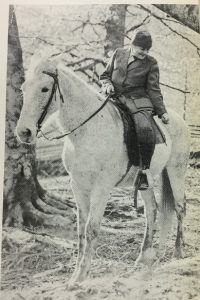The trials of life can crush one’s spirit or force one to overcome and create something exceptional out of the rubble. Mary Breckinridge, a 1910 St. Luke’s Hospital School of Nursing alumna, is a fine example of later. Born into a Kentucky family of influence and means, Breckinridge was well educated and well-traveled. She was married in 1904 and widowed by 1906, at age 26. She then completed St. Luke’s nursing program and worked teaching French and hygiene in an Arkansas women’s college. In 1912, she married the president of that school and had two children with him, but her daughter was premature and did not survive; her son died suddenly two years later at age four.
Additional struggles broke the marriage beyond repair and she left her husband in 1918 and worked as a public health nurse while awaiting a posting with the American Red Cross in France. She arrived there after the armistice of WW I and helped to initiate a program to provide food and medical assistance for children, nursing mothers, and pregnant women. While in France, she also spent time in England, observing the conditions of children and mothers there, and became convinced that American women in rural areas would benefit from the help of trained midwives. Ad educational visit to Scotland demonstrated how to provide medical care to a dispersed population.

Returning to the United States, she relocated to Leslie County, Kentucky, which had the highest maternal mortality rate in the country. Here Breckinridge, pictured left, introduced nurse-midwives into the region with the founding of The Frontier Nursing Service in 1925, eventually bringing maternal and neonatal death rates down well below the national average. In 1929, The Frontier Nursing Service staff started the American Association of Nurse-Midwives, a precursor of the American College of Nurse-Midwives, and the first American school of midwifery in New York in 1932. Mary Breckinridge served as director of the FNS until her death on May 16, 1965.
